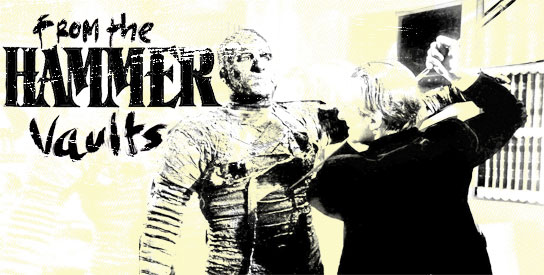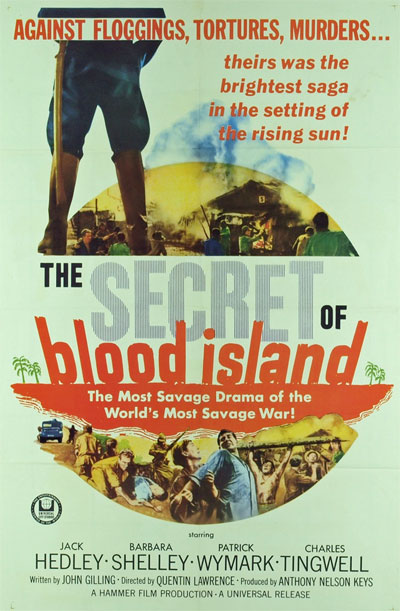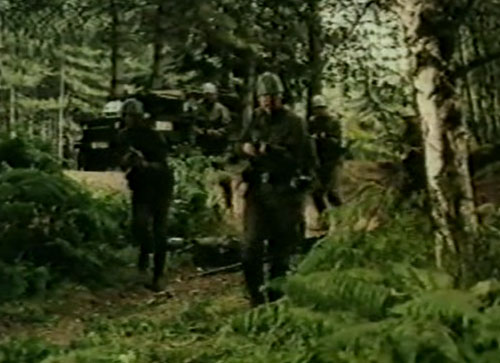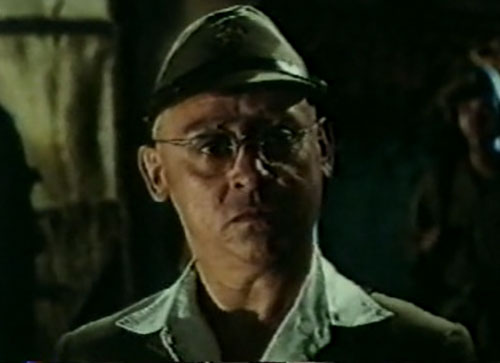
THE SECRET OF BLOOD ISLAND
1964, Quentin Lawrence


The tropical setting of Blood Island
I first became aware of the existence of The Secret of Blood Island when I stumbled across its Australian daybill poster at a junk shop. I bought the poster, assuming it was an Australian retitling of The Camp on Blood Island. When I got it home, I noticed the name “Charles Tingwell” loudly printed across the poster and realised it was a Hammer film I’d yet to see. I’m sure that Charles ‘Bud’ Tingwell’s appearance is the reason Australian viewers would have interest in seeing this – and I was no exception. Finally tracking down a badly duped copy, I settled down to see one of Australia’s finest actors acting alongside Hammer regulars. While The Secret of Blood Island lacks the excitement of The Camp on Blood Island and the class of Yesterday’s Enemy, its cast is certainly a worthy draw card. Tingwell receives far more screen time than he would in Hammer’s Dracula: Prince of Darkness (1966), and he excels in his authoritative role. Barbara Shelley – who would co-star with Tingwell again in Dracula: Prince of Darkness – is also a welcome member of the cast and her performance is, as expected, excellent. Jack Hedley does well as the hero, but – sadly, for mostly the wrong reasons – it’s the villains that steal the show.

A young Charles 'Bud' Tingwell
The Secret of Blood Island repeats the offensive casting of Caucasians in the villainous Japanese roles. The villains are not quite as cartoonish when compared to The Camp on Blood Island, but they come close. The Japanese are led by Major Jocomo, who is played by British actor Patrick Wymark. Wymark’s performance is ridiculous to say the least. He puts on a squeaky voice filled with all the classic erroneous qualities that we’d expect from a Japanese caricature. Michael Ripper, the ultimate Hammer actor, plays Lieutenant Tojoko; somewhat of a sidekick to Jocomo. Ripper, his second time in yellow-face (he also appeared in The Camp on Blood Island), fails to hide his cockney accent, but actually fares a lot better when placed next to Wymark. Ripper is at least threatening in his role and restrains from reaching the level of absurdity that Wymark aims at. But even Wymark is outdone by the outrageous Japanese impersonation from David Saire in the small role of the chief of the secret police. Watch below to see all three actors hamming it up something rotten:
I don’t think anyone could argue that The Secret of Blood Island is one of Hammer’s crowning achievements, but it’s a shame that it has been cursed to forever lie in obscurity. The story is engaging enough, and the central concept of a woman being hid in a prison camp is reasonably exciting. Despite its predictability, the film is never dull. And as silly as the villains are and as stilted as some of the dialogue is (Michael Ripped smugly spitting out “British cigarette” made me laugh), the protagonists are likeable enough. The Secret of Blood Island is a bit light on the action, but the ending – which we also see part of in the film’s introduction – supplies a few gunshots and explosions making for a decent conclusion. The Secret of Blood Island will hardly bowl over your average viewer, but I can highly recommend this to those interested in Hammer’s take on World War II. It’s also fascinating to watch as an Australian for the appearance of the late, great Charles ‘Bud’ Tingwell. Look past the racism – or have a good laugh at it – and be mildly entertained by The Secret of Blood Island.

Hammer's Michael Ripper in yellow-face





1 comment
Blood Island | Movie Platinum says:
Apr 21, 2016
[…] The Secret of Blood Island (1964) […]